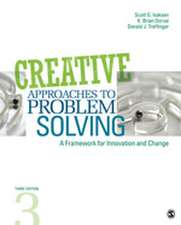Organizational Myopia: Problems of Rationality and Foresight in Organizations
Autor Maurizio Catinoen Limba Engleză Paperback – 29 oct 2014
| Toate formatele și edițiile | Preț | Express |
|---|---|---|
| Paperback (1) | 321.65 lei 6-8 săpt. | |
| Cambridge University Press – 29 oct 2014 | 321.65 lei 6-8 săpt. | |
| Hardback (1) | 724.77 lei 6-8 săpt. | |
| Cambridge University Press – 13 feb 2013 | 724.77 lei 6-8 săpt. |
Preț: 321.65 lei
Nou
Puncte Express: 482
Preț estimativ în valută:
61.55€ • 64.26$ • 50.94£
61.55€ • 64.26$ • 50.94£
Carte tipărită la comandă
Livrare economică 05-19 aprilie
Preluare comenzi: 021 569.72.76
Specificații
ISBN-13: 9781107447219
ISBN-10: 1107447216
Pagini: 270
Ilustrații: 5 b/w illus. 12 tables
Dimensiuni: 152 x 229 x 14 mm
Greutate: 0.36 kg
Editura: Cambridge University Press
Colecția Cambridge University Press
Locul publicării:New York, United States
ISBN-10: 1107447216
Pagini: 270
Ilustrații: 5 b/w illus. 12 tables
Dimensiuni: 152 x 229 x 14 mm
Greutate: 0.36 kg
Editura: Cambridge University Press
Colecția Cambridge University Press
Locul publicării:New York, United States
Cuprins
Introduction; 1. Cases of myopia; 2. Uncertainty and predictability in organizations; 3. The mechanisms of organizational myopia; 4. Anticipating risk: the problem of learning; 5. Implications for organizational design; Epilogue.
Recenzii
'The classic studies of bureaucracy emphasized how organizations made people collectively smarter. Organizational Myopia shows how and why organizations can dumb people down. Its multi-level perspective, novel analytic framework (distinguishing predictable vs. unpredictable surprises and manageable and unmanageable events) and vivid illustrations (exploding spacecraft, economic disasters, military misadventures, and many more) make [it] a book that will inform and engage seasoned scholars and novices alike.' Paul DiMaggio, A. Barton Hepburn Professor of Sociology and Public Affairs, Princeton University
'Drawing us in with unsettling tales of the dark side of organizations, Catino leads us through the diversity of things that go wrong to reveal the common patterns across famous and infamous cases of unanticipated outcomes. Creatively pulling together and analyzing a wide interdisciplinary scholarship, he offers strategies for control that target the causes of organizational blind spots. Engaging, well-written, and of crucial importance, Organizational Myopia is a must-read for students, scholars of organizations, executives, risk management specialists, policy makers, and people working in organizations of every kind.' Diane Vaughan, Columbia University
'Individuals, organizations, and collective groups routinely overestimate their own capabilities and are deaf to warning signals of pending troubles. This overconfidence has systemic features that are deftly analyzed by Maurizio Catino, in this splendid survey of how organizations often recognize danger only when it is too late. But Catino thinks hubris can be remedied and he offers a spirited case for overcoming myopia through a commitment to experimentation and a focus on learning from failure. This accessible book is a welcome contribution to understanding how organizations can overcome their lack of foresight.' Walter W. Powell, Stanford University
'… Organizational Myopia is an overwhelming success, likely to be of significant interest to researchers, practitioners, students, and experts alike. Organizational researchers, to start, will benefit from the near-encyclopedic reproduction of decades' worth of research on individual-, social-, and organizational-level phenomena related to decision making, learning, and risk, most notably.' Edward Bishop Smith, American Journal of Sociology
'Drawing us in with unsettling tales of the dark side of organizations, Catino leads us through the diversity of things that go wrong to reveal the common patterns across famous and infamous cases of unanticipated outcomes. Creatively pulling together and analyzing a wide interdisciplinary scholarship, he offers strategies for control that target the causes of organizational blind spots. Engaging, well-written, and of crucial importance, Organizational Myopia is a must-read for students, scholars of organizations, executives, risk management specialists, policy makers, and people working in organizations of every kind.' Diane Vaughan, Columbia University
'Individuals, organizations, and collective groups routinely overestimate their own capabilities and are deaf to warning signals of pending troubles. This overconfidence has systemic features that are deftly analyzed by Maurizio Catino, in this splendid survey of how organizations often recognize danger only when it is too late. But Catino thinks hubris can be remedied and he offers a spirited case for overcoming myopia through a commitment to experimentation and a focus on learning from failure. This accessible book is a welcome contribution to understanding how organizations can overcome their lack of foresight.' Walter W. Powell, Stanford University
'… Organizational Myopia is an overwhelming success, likely to be of significant interest to researchers, practitioners, students, and experts alike. Organizational researchers, to start, will benefit from the near-encyclopedic reproduction of decades' worth of research on individual-, social-, and organizational-level phenomena related to decision making, learning, and risk, most notably.' Edward Bishop Smith, American Journal of Sociology
Notă biografică
Descriere
The book examines the mechanisms that generate myopia in organizations and explores how organizations can foresee and contain unexpected events.













